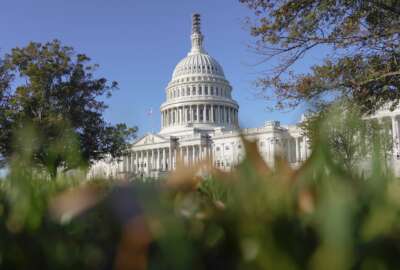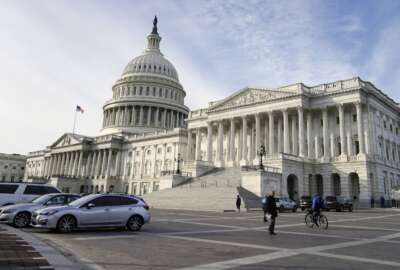TSP sends out info on recalculated life expectancy numbers
In today's Federal Newscast: Some TSP participants can expect some information about recalculated life expectancy numbers. The VA plans new research using...
- Good news for those agencies facing a possible shutdown in less than 11 days, but not so good for the IRS. As part of the fiscal 2024 topline spending deal House and Senate lawmakers agreed to yesterday, the $20 billion in cuts Congress already approved for the IRS would speed up. The new agreement also rescinds about $6 billion in unspent COVID relief money. But the topline agreement keeps non-defense discretionary budgets basically flat and increases defense discretionary spending by $26 billion. Congress must still pass the appropriations bills before the current continuing resolution expires to avoid a shutdown. That CR funds some agencies through January 19 and others through February 2.(Congress agrees to a topline budget for 2024 - Associated Press)
- Telework may lead to better agency services and cost savings. Although telework levels for federal employees are gradually declining, the Office of Personnel Management said keeping some flexibility will improve workforce productivity. Telework for feds can also lead to better employee engagement and lower staff attrition. For agencies, telework often yields larger recruitment pools and more cost savings. OPM's latest report to Congress on telework shows that about 46% of feds teleworked at least some of the time during fiscal 2022. It's a 1% decrease since the previous year.(Status of telework in the federal government report to Congress - Office of Personnel Management)
- Thrift Savings Plan participants should check for some important mail coming this month. The TSP board is sending out tax forms to participants who received a withdrawal during 2023. Some TSP participants will also get more information about recalculated life expectancy numbers. Participants who receive life expectancy installments will get documentation of those new amounts in the coming weeks. And any participants who will be 73 and older this year should keep an eye out for mail detailing their required minimum distribution calculations.(January processing schedule - Thrift Savings Plan)
- The results are in for the impact of the Technology Modernization Fund in 2023. The final numbers for the TMF in 2023: 18 projects, 17 agencies and $177 million invested. The TMF Board said in its year-end impact report that of those 18 projects, 10 were for cybersecurity needs, six were to modernize public-facing digital services and two were to address legacy systems. The board also said, on average, it transferred funding to these agencies 17 business days faster than in 2022. The impact report is part of how the board is trying to convince Congress to fund the TMF in 2024. So far, Congress has allocated no funding for the TMF in draft appropriations bills.(TMF Board: 18 projects, $177M invested in 2023 - TMFCIO.gov)
- Several civilian nominees up for promotion in the Pentagon are still awaiting action by the Senate. While the Senate confirmed most of the military promotions, six civilian promotions remain on hold. Those include Ronald Keohane, tapped to be assistant secretary for manpower and reserve affairs. Melissa Dalton is awaiting to be confirmed as under secretary of the Air Force, the second highest service post. And Cara Abercrombie is waiting to take over as assistant secretary of defense for acquisition. Sen. Tommy Tuberville (R-Ala.) held up military and civilian promotions for almost 10 months, to protest the Pentagon’s abortion policy.
- The Cyber National Mission Force got a new chief. Marine Corps Maj. Gen. Lorna Mahlock assumed command of the elite cyber force in a January 5 ceremony. Mahlock most recently served as the deputy director for combat support for the National Security Agency’s Cybersecurity Directorate. She replaced Army Maj. Gen. William Hartman, who was confirmed to serve as U.S. Cyber Command's deputy chief. The Cyber National Mission Force was established in 2014 and became a permanent organization within CYBERCOM in 2022.(Cyber National Mission Force gets a new chief - U.S. Cyber Command)
- The Department of Veterans Affairs, for the first time in 50 years, is planning new research into the benefits of using psychedelics to treat post-traumatic stress disorder and depression in veterans. Veterans service organizations and mental health provider groups have pressed the VA to conduct such research. The fiscal 2024 National Defense Authorization Act for fiscal year 2024 also authorized the study of psychedelics across similar populations in the Defense Department.(To improve care for Veterans, VA to fund studies on new therapies for treating mental health conditions - Department of Veterans Affairs)
- Private sector cloud-security experts have their opportunity to influence and impact how the government continues to implement these security services. The Federal Secure Cloud Advisory Committee is looking to fill four open seats. All four positions are open for private sector experts, whose companies provide cloud products and services. Two positions are specifically reserved for small business representatives. The committee provides advice and recommendations to the General Services Administration, the FedRAMP board and agencies on technical, financial, programmatic and operational matters regarding the secure adoption of cloud-computing products and services. Applications for the advisory committee are due by January 22.(Federal Secure Cloud Advisory Committee looking to fill 4 seats - Federal Register)
Copyright © 2025 Federal News Network. All rights reserved. This website is not intended for users located within the European Economic Area.
Peter Musurlian
Peter Musurlian is a producer at Federal News Network.
Follow @PMusurlianWFED






